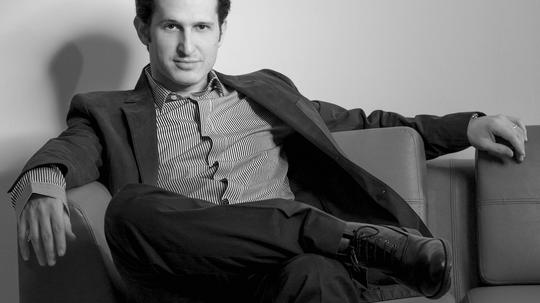
Long before he was the CEO and co-founder of one of the fastest-growing fantasy sports startups in the world, Jason Robins was faced with a predicament familiar to the millions of users who frequent the site he's helped to make so popular. Still in college at that point, Robins was immersed in fantasy football. And he showcased a trait that not only elevated his fantasy ability, but would become a trademark for the success of his company, DraftKings.
"Edgerrin James was just by far the player who had been carrying me all year," Robins recalled of his fantasy team in the early 2000s during a recent interview with BostInno. "But I knew that Tony Dungy was the (Colts) coach and he was in favor of resting players."
In other words, it sounds like a classic predicament of fantasy football. How did Robins respond? He made a proactive move, and traded the star of his team.
"I traded him for Kurt Warner and Torry Holt," Robins remembers. And despite taking heat for the supposedly lopsided deal, the move led to a championship.
It gave me a way of participating in a way like no other experience I’d ever had.
"It turned out that trade saved my season, because sure enough, Edge got very limited carries the last few weeks of the season, and the week that was the championship game was where Warner and Holt both went nuts. So it ended up working out, but I got a lot of crap for that. They told me I was throwing away my season and it was an idiotic trade."
It's a nice anecdotal glimpse into one of Boston's fastest-rising CEOs, and also helps to explain the impressive growth of DraftKings. Instead of reacting to the existing fantasy market, Robins and DraftKings co-founders Matt Kalish and Paul Lieberman have helped to forge a new market for daily fantasy. And like the Edgerrin James trade, that's made all the difference for the young company and its 34-year-old founder.
Playing in 200 fantasy leagues
Robins was born in California, but grew up in Miami. From a young age, he not only loved sports (a trait he inherited from his parents) but also fantasy sports.
"I’ve been a fantasy player pretty much since I can remember fantasy being around on the internet," he said. And Robins offered a fascinating quote regarding why he took to fantasy so easily:
It was everything that I hoped would come from a game. The content was always new. It was sports. And I was a big games guy in general. I played a lot of chess as a kid. I played a lot of cards, but fantasy was to me just the ultimate, because it was not just a game, it was a game centered around something in real life that I liked: sports themselves. And it gave me a way of participating in a way like no other experience I’d ever had.
It's a pinpoint explanation for why so many people flock to fantasy. The game offers the overwhelming majority who can't actually play professional sports a way of directly participating.
And Robins, like so many others in the birth of the online fantasy sports era, became infatuated. His interest was to a level that he almost had trouble admitting.
"It’s a little embarrassing," Robins said, "but I was probably in the neighborhood of like 200 fantasy leagues as a kid."
Robins was quick to follow up.
"Well when they were first coming out, it wasn’t like there were dominant players, right? There were 20 different sites that had them, and there were all different game types and formats. There was no ‘normal format,’ so I played them all."
DraftKings' Boston base
The ongoing discussion of Boston's place in the startup world is one that's familiar to Robins. After all, along Robins started DraftKings with Kalish and Lieberman after moving to Boston originally to work for Capital One and then Vistaprint.
"A lot of what was going on at the time (when DraftKings was founded) was going on in Silicon Valley. There was this notion that that was the only place where things were happening," Robins said. Yet he's never bought into the narrative that Boston can't be a beneficial startup environment.
"Boston has some real advantages to being in a place like this over, say, the Bay Area, where yes, there’s a lot of great talent and innovation, but also it’s extraordinarily competitive for that talent."
Pointing to the universities as well, Robins mentions that DraftKings is well positioned to keep adding top talent.
And given the subject of his business, Boston offers another major advantage. Recalling his childhood in Miami, he contrasted the fan bases, with Florida in his youth not measuring up.
"Boston is the complete opposite. Boston is one of the oldest sports towns," noted Robins. "The fans are knowledgable, and they truly care."
Of course, the success of DraftKings has been built on its appeal to fans everywhere. And in that sense, the past 12 months have been extraordinary. Especially, Robins pointed out, the 2014 NFL season.
"I went from telling people about what I do and them saying ‘hmm, that’s interesting, I’ve never heard of that before,’ to ‘Yeah, I’ve heard of DraftKings,’" He explained. "It got to a point where people knew who we were, and that was pretty cool."
In 2015, the company that started as a continuation of a lifelong passion for fantasy sports has a near-billion dollar valuation, putting it in company with a class of startups investors term "unicorns." Robins and his colleagues remain unfazed.
"It's definitely been a fun ride," he says, reflecting. "It's hard to really go and look back sometimes and think through three years. We're very much in the moment. Also we're really looking forward quite a bit."
To hear more from Robins in person, check out BostInno's State of Innovation event June 16. Details below:
Images via Ian Travis Barnard and DraftKings








